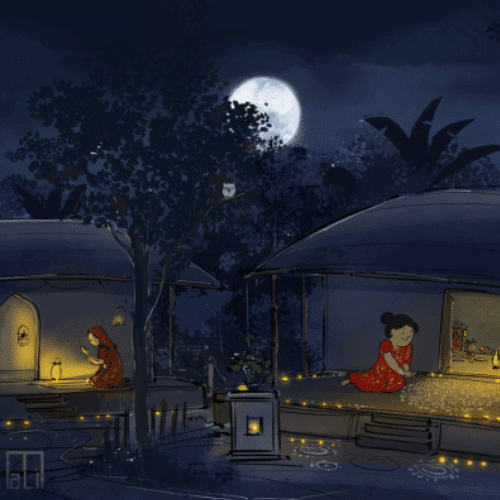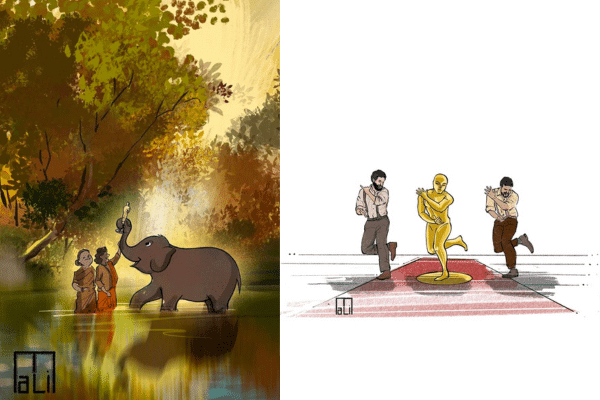Two women saunter along a dirt road in a peaceful rural setting. They seem content, and the surrounds are beautiful.
It’s a simple illustration – there are no words, or even an accompanying caption.
Yet artist and cartoonist MAli’s work has the effect of a veritable salve, soothing and warming our hearts.
It comes days after a devastating viral video from the northeast of India makes international news, bringing a sense of shame and rage for its disturbing and dehumanising content.
That dirt road in MAli’s reimagined version is all too familiar, but there is peace and amity and goodwill… and beauty.
“Simplicity is the primary focus in my work,” the Newcastle-based creator tells Indian Link. “The intention is always to bring people together rather than create division. Those who are familiar with current affairs can often decipher the underlying meanings in my cartoons.”
The piece in question was lapped up by an 180,000-strong social media following for MAli’s Cartoons.
But this is just another day’s work for MAli – short for Mahafuj Ali.

The 36-year-old landscape architect by day and cartoonist-illustrator by night, has seen his creations published regularly in India’s leading Bengali daily Ananda Bazar Patrika’s online portal Aaro Ananda, and in The Times of India.
Posting a cartoon a day, his focus remains India and what Indians are taking about.
MAli’s cartoons are observations or commentary covering the entire gamut of topics from sports to politics and philosophy to lifestyle, but it’s his take on communal harmony that’s the most impactful. cartoon
A while ago when two different festivals Lokkhi Pujo (Lakshmi Puja) and Mawlid al-Nabi (Prophet Mohammed’s Birthday) fell on the same day, Mahafuj claims the divisive nature of the banter on social media left him more disconcerted than usual.

His contribution to the debate was a simple illustration – a harmonious scene where one neighbour is gracefully creating alpona (floor design) at her threshold, while another neighbour sits in dignified namaaz (prayer), with the moon overlooking both households.
This simple but powerful imagery carried a profound message, and went on to become a favourite of its creator.
“The underlying idea was to emphasize the importance of mutual respect,” Mahafuj explains. “While it is natural for us to cherish and uphold our own customs and rituals, we must also hold in high regard the customs and beliefs of others. Unity and understanding, tolerance and acceptance, can flourish when we acknowledge the diversity that enriches our society.”
What’s his approach when he’s tackling a subject that’s politically charged?
“I always go back to the dignity of the common Indian,” he describes. “My illustrations are pretty straightforward, often reflecting my personal experiences. My trips back home to India inspire me, and I draw from my observations of the country.”
By way of example, he describes a recent train journey. Train travel has undergone a revolution in recent years, but the advancements are not for everybody.

“Travelling from Kolkata to my hometown Krishnanagar, I took the local train, which was incredibly overcrowded. The experience was so overwhelming that I nearly fell sick, especially considering it was winter – I can only imagine the discomfort during summer. Ironically, on that same train, there were posters of the flash new Vande Bharat Express, which highlighted the disparities in our society. Another incident that struck me was witnessing an elderly man struggling to climb the stairs from the platform to the exit at my hometown’s train station. It was evident that there were no provisions for better accessibility at such crucial public places.”
These observations of the common Indian’s struggles to lead a dignified life left a profound impact on Mahafuj.
“Irrespective of the political party involved, the core idea should always be ‘for the people’,” he stresses. “Through my cartoons, I try to shed light on these issues and advocate for positive change, promoting unity and understanding among people from all walks of life.”
Is it okay though, to comment on India, or about issues in India, we ask, when you are sitting thousands of kilometres away?

“The world we live in today is vastly different from what it was two decades ago. The advent of social media has transformed the way we connect with people, breaking down geographical barriers and rendering borders less significant. We now have real-time access to news from all across the globe, thanks to the widespread use of social platforms and the numerous WhatsApp groups we are part of – be it family, school, college, or friends. Conversations are constantly buzzing in every sphere of our lives, making us more interconnected than ever before, at least in the virtual realm.”
He adds, “Despite not being directly affected by events taking place in India, I firmly believe it is crucial to acknowledge and address the persistent issues that plague our motherland. By engaging in meaningful conversations and shedding light on pertinent issues, we can contribute to positive change and support our communities, even from afar.”

Given that these ‘pertinent issues’ are so often political and communal, he must cop a fair bit of online abuse.
“Negative comments do take a toll on me at times. While I try not to let it bother me, there are days when it becomes overwhelming. In such cases, I find it necessary to block these individuals to protect my mental well-being.”
The effect of such trolling on his parents back in India is another cause for concern. “When they come across hateful comments, they worry about my well-being. Out of consideration for them, I often end up deleting hurtful comments.”

However, he has also experienced moments of incredible support. “Instead of letting the negativity prevail, many followers often step in and respond to the haters and abusers in a positive and creative manner. Witnessing this transformation of negativity into positivity in the comments section of my posts brings me much joy – and amusement, too. It is heartening to see my fans defending me and using their creativity to counteract the negativity. In the face of criticism and hostility, having such a supportive fanbase makes the challenging journey as a cartoonist worthwhile.”
As a close observer of the trends and movements in India, we cannot let Mahafuj go without asking him one final question. What is ideal India according to you?
“An ideal India embodies a boundless heart that embraces and respects all cultures, languages, and religions,” he replies. “It exemplifies the essence of Mile Sur Mera Tumhara, Toh Sur Bane Humara – a harmonious blend of our diverse identities coming together as one. This is the India we were fortunate to grow up in, where the spirit of unity prevails.”

It is clear that ‘humara’, the collective – and the inclusive – is the primary element in MAli’s Cartoons, and in Mahafuj’s philosophy.
- With Rajni Anand Luthra
Read more: MAli’s Cartoons: A FIFA cartoon a day




